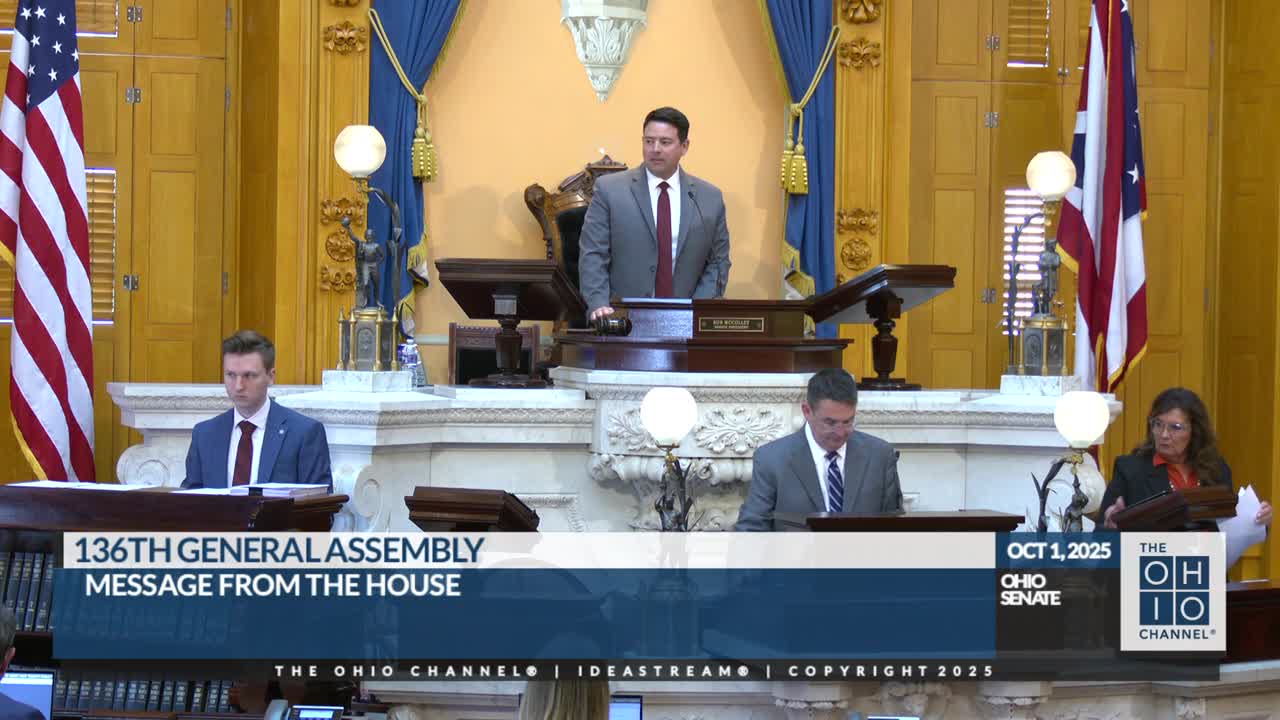Senate overrides governor on budget line-item tied to property-tax levy changes; vote 21-11
October 01, 2025 | Senate, Committees, Legislative, Ohio
This article was created by AI summarizing key points discussed. AI makes mistakes, so for full details and context, please refer to the video of the full meeting. Please report any errors so we can fix them. Report an error »

The Ohio Senate voted on Sept. 30, 2025 to pass item 66 of amended substitute House Bill 96 notwithstanding the governor��2s objections, overriding the line-item veto by a 21-11 margin. The item includes changes to how several school levy types are treated and a requirement that ballot language describe the county auditor��2s market value.
Proponents described the provision as a step toward simplifying property-tax levies and increasing ballot transparency. Senator O'Brien urged colleagues to override the governor, saying many voters are confused by levy types and that reforms were needed to prevent what she called escalating tax burdens. Senator Roegner framed the item as a first step toward property-tax relief, saying simplification "will help provide clarity by simplifying the property tax code." Senator Sereno argued the changes would not repeal existing levies and would help apply tax reduction factors over time.
Opponents said the override strips tools from local governments and does not provide real tax relief. Senator DeMora said the item "is not property tax relief" and warned that eliminating certain levy types would take away districts' ability to respond to emergencies, potentially forcing larger permanent levies later. Senator Antonio said the override "strips power from voters, weakens schools and communities, and shifts the burden without solving the real problem," and urged a no vote.
Nut graf: The override prompted a long floor debate tying together property-tax policy, school funding levels, and competing views about local control versus statewide reforms. Supporters framed the measure as clarity and a step toward relief; opponents said it removes local options without truly addressing the underlying tax structure.
Key details in debate included competing claims about state school funding: Senator Smith argued Ohio has reduced state support for schools over decades and that the state has prioritized tax cuts for high-income households, while Senator Brenner said state aid to districts has increased in recent years and argued that taxpayers deserve more transparency about levy language and classifications.
The clerk��2s reading and multiple floor speeches preceded a roll-call vote. The Senate announced the override passed "with 21 yays and 11 nays," meeting the constitutionally required majority to override the governor's objection for that item. The Senate then moved and agreed without objection to lay consideration of remaining line items 1 through 65 and item 67 on the table.
Ending: The override reasserted the legislature's adopted budget language on levy types and ballot disclosure; the transcript records the vote result and floor debate but does not include new statutory text beyond the description in the journal.
Proponents described the provision as a step toward simplifying property-tax levies and increasing ballot transparency. Senator O'Brien urged colleagues to override the governor, saying many voters are confused by levy types and that reforms were needed to prevent what she called escalating tax burdens. Senator Roegner framed the item as a first step toward property-tax relief, saying simplification "will help provide clarity by simplifying the property tax code." Senator Sereno argued the changes would not repeal existing levies and would help apply tax reduction factors over time.
Opponents said the override strips tools from local governments and does not provide real tax relief. Senator DeMora said the item "is not property tax relief" and warned that eliminating certain levy types would take away districts' ability to respond to emergencies, potentially forcing larger permanent levies later. Senator Antonio said the override "strips power from voters, weakens schools and communities, and shifts the burden without solving the real problem," and urged a no vote.
Nut graf: The override prompted a long floor debate tying together property-tax policy, school funding levels, and competing views about local control versus statewide reforms. Supporters framed the measure as clarity and a step toward relief; opponents said it removes local options without truly addressing the underlying tax structure.
Key details in debate included competing claims about state school funding: Senator Smith argued Ohio has reduced state support for schools over decades and that the state has prioritized tax cuts for high-income households, while Senator Brenner said state aid to districts has increased in recent years and argued that taxpayers deserve more transparency about levy language and classifications.
The clerk��2s reading and multiple floor speeches preceded a roll-call vote. The Senate announced the override passed "with 21 yays and 11 nays," meeting the constitutionally required majority to override the governor's objection for that item. The Senate then moved and agreed without objection to lay consideration of remaining line items 1 through 65 and item 67 on the table.
Ending: The override reasserted the legislature's adopted budget language on levy types and ballot disclosure; the transcript records the vote result and floor debate but does not include new statutory text beyond the description in the journal.
View full meeting
This article is based on a recent meeting—watch the full video and explore the complete transcript for deeper insights into the discussion.
View full meeting
